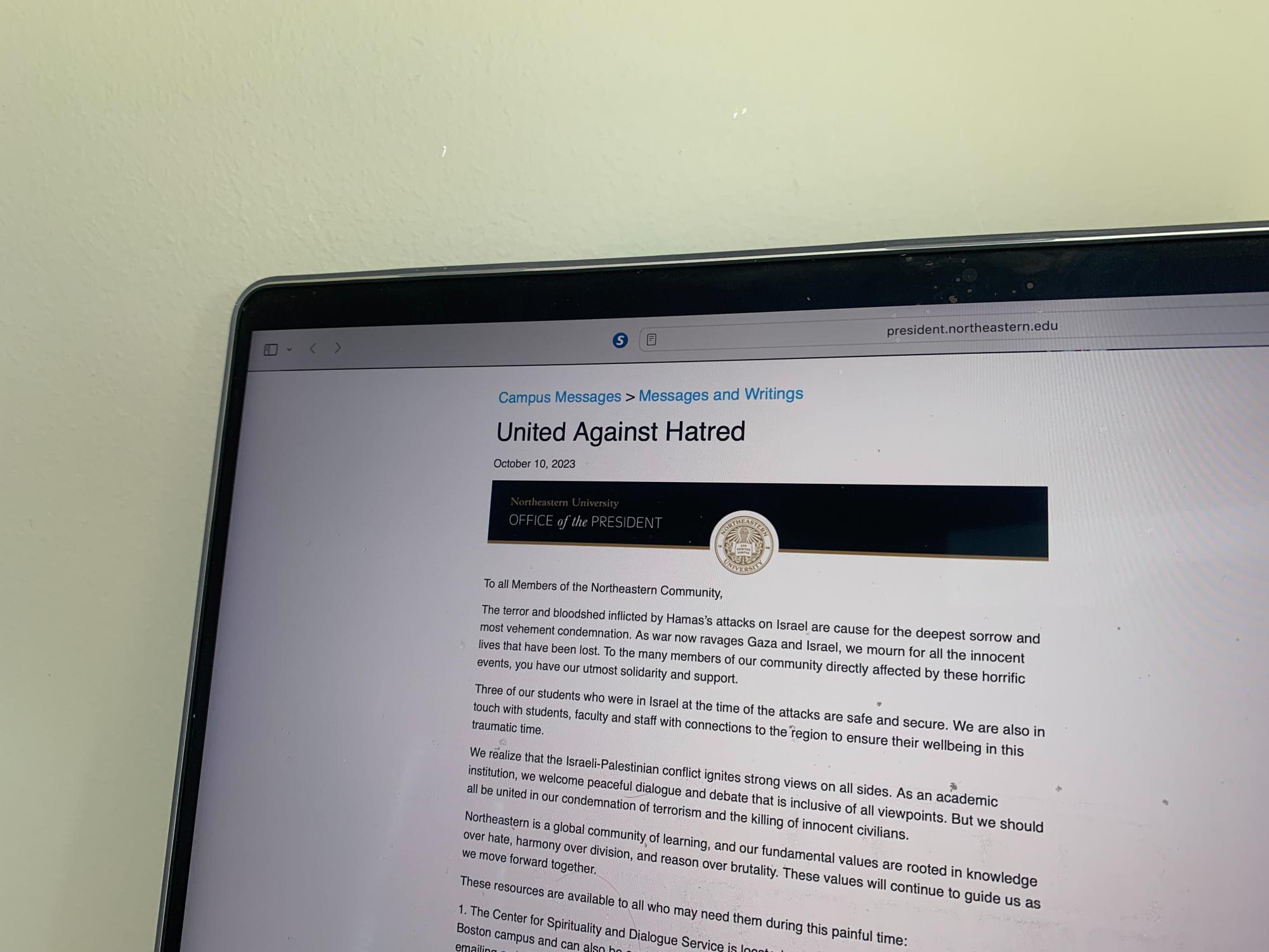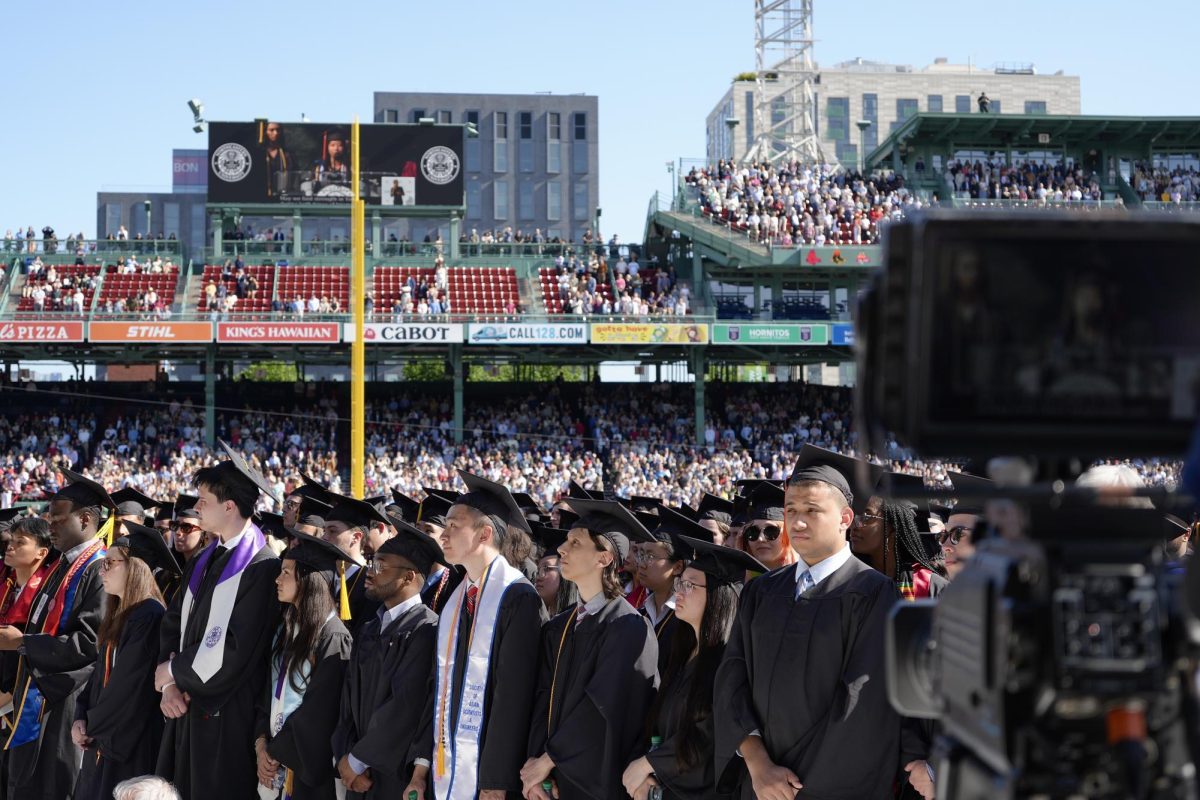Over the years, it has become a rare sight for students to approve of Northeastern’s administration. Such is the burdensome reality of leadership — you are more likely to be criticized for your wrongdoings than praised for a job well done. As such, administrators certainly fall victim to students’ misinterpretations, as we often label their intentions as malicious when they are anything but. Yet in certain cases, students’ frustrations often function as indicators pointing to a university policy that has gone amiss.
Consider the university-wide emails and official statements published via social media following Russia’s invasion of Ukraine and Hamas’s recent attack on Israel. One quick read through Northeastern’s Instagram comment section is all that is needed to show the student body’s dissatisfaction with the university’s stated positions on these sensitive topics.
The public statements themselves are brief and well-intentioned. Their goal is to call out horrific acts of violence, comfort students who might be directly impacted and draw a clear distinction between actions the university sees as acceptable and those it sees as abhorrent. Read individually, each statement is uncontroversial, genuine and compassionate. Yet, as recently articulated by a Harvard Working Group report, issues surrounding these statements arise not from their respective content, but from our comparison to their nonexistent counterparts.
President Joseph E. Aoun’s March 2022 statement on Russia’s invasion of Ukraine — emailed to all current Northeastern students and faculty — reads, “War, violence and displacement anywhere are affronts to humans everywhere.” While a sincere and important message, the university’s intent in publishing this statement was not to share an institutional position against all “war, violence, and displacement” but instead to take a very specific position on a particular conflict. This specificity begs the question: What is distinct about the Russia-Ukraine and Israel-Gaza conflicts that explains the university’s desire to publish a statement?
Why does the administration feel an obligation to publish a statement condemning Russia and Hamas’ attacks, but not one deploring Azerbaijan’s recent ethnic cleansing campaign, the slaughter of thousands in Sudan, Israel’s indefensible actions in the West Bank and Gaza, or China’s crimes against humanity against the Uyghurs?
Releasing public, university-wide statements on only a select few conflicts deems the others as irrelevant, and those mentioned as more important, violent and morally repulsive. Not only should we be wary of classifying specific acts of genocide, ethnic cleansing and wars of aggression as being morally worse than the others, but we should wonder how the university goes about determining which conflicts deserve the attention of the Northeastern community.
If it is the case that the university holds some institutional standard to determine which conflicts merit a university position and which do not — as opposed to an ad hoc decision at the whim of the chief administrators — such standards appear very difficult to justify.
If the administration’s standard for when to publish their perspective involves the crossing of some ethical threshold, the application of such a standard seems obviously to have been applied arbitrarily.
What is the explanation from the administration as to why Iran’s crackdown and execution of protestors, Ethiopia’s human rights abuses against the people in the Tigray region and the myriad of instances expressed earlier in this article are not indeed cases of this ethical threshold being crossed?
More worrying still is the possibility that the university’s decision in taking a stand on a particular conflict is not based on ethical considerations, but instead on political ones. Are administrators being influenced by the desires of their wealthy donors? Are they making a calculation that seeks to increase the school’s public image? Are they taking the student body’s personal views into account?
If any of these questions are answered in the affirmative, the student body should find it alarming. The positions Northeastern takes on such topics should not be influenced neither by donors nor by the student body, but instead guided by a coherent standard that follows from the university’s core values and grounding principles. Unfortunately, Northeastern has failed to clearly lay out such a standard and apply it consistently.
When a standard becomes too blurred to discern, it is often best to erase it altogether. Pivoting to a university-wide policy of neutrality when it comes to domestic and foreign conflicts would be a prudent decision for the administrators to make. Such a policy would quell at least a portion of the tension that persists between students and administrators. Most importantly, it would further align Northeastern to the principle role of what it means to be a university: to provide “a universe” of perspectives for all its students and encourage all types of dissent.
Jack Masliah is a third-year political science and philosophy combined major. He can be reached at masliahlitchi.j@northeastern.edu
















